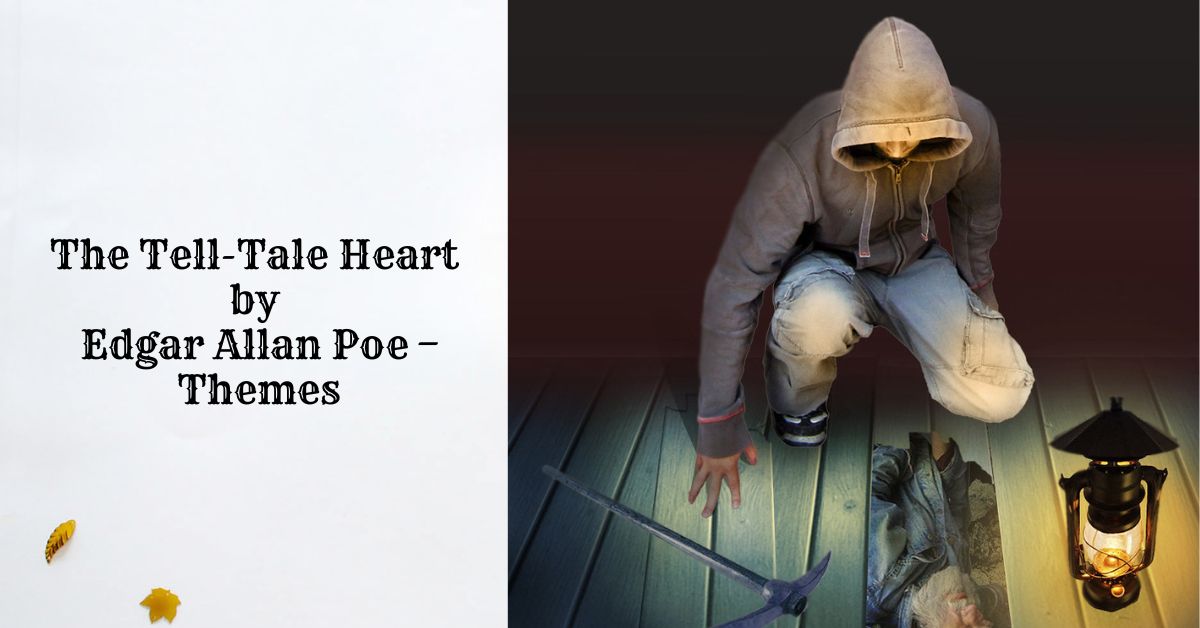The Tell-Tale Heart by Edgar Allan Poe, a phenomenal American writer, and poet, is a heart-wrenching tale of a psychopath. First published in 1843, the story focuses on inner psychological concerns and drastic impacts on humanity. While unfolding the phenomenon of mental illness in the story, the writer touches on various themes. Some of the major themes of the story are as follows.
1. Madness
Madness and sanity is the central theme of the story, The Tell-Tale Heart. Right from the start of the story, the narrator demands to know why his listeners consider him mad. The way he explains his meticulous plans to kill the old man whose vulture eye makes him crazy proves his madness. He claims that he shares no enmity or hatred for the poor soul; it’s only his eye that makes him go crazy. Therefore, he kills that innocent man to avoid his irritating eye. Unfortunately, even after committing a heinous crime, he fails to get the desired peace of mind. Instead, he finds himself in mote disturbing situation.
2. Death
Death also holds a thematic value in The Tell-Tale Heart as the story revolves around the merciless death of an old man. The narrator does not fight, clash, or rivalry with the old man. To our surprise, the older man’s vulture eye becomes the reason for his painful death. Although he kills the old man wisely, the writer unfolds that person’s die, but crime never dies. He thinks that the old man’s death would win a peaceful life for the narrator. Unfortunately, his death adds more to his miseries. The constant beating of old man’s heart in his subconscious mind never let him take a sigh of relief. Even after death
3. Psychological Disorder
Psychological disorder is yet another important theme of the story. The narrator of the story has a mental illness. He feels anxious and crazy as he sees the old man’s eye, and he decides to mutilate the old man. His strange feelings regarding the old man’s vulture eye drive him to kill an innocent man. To satisfy his evil senses, he kills the old man rudely by dragging him onto the floor, even pulling the bed over him till he is dead. His schizophrenic mind makes him believe that the old man’s eye poses a serious threat to his life. Thus, this idea makes him nervous and leads him toward the verge of criminal activity.
4. Guilt
Guilt is also a significant theme that marks the center of The Tell-Tale Heart. Undoubtedly, the narrator does something unlawful, but the guilt and his inner demon never allow him to take a sigh of relief. The writer has beautifully described the way he tries to hide the murder. He tries his best to make the guard believe that nothing odd has happened in the house. He even tries to hold his inner demons and claims to be innocent; his guilt manifests in the sound of the dead man’s beating heart. Unfortunately, his guilt grows so great that he fails to hold it in and confesses his crime.
5. Fear of Mortality
The more profound reading of the text claims that the protagonist murders the old man and later confesses his crime because of his own fear of mortality. The way he hates the “vulture-eye” of the old man shows his fixation on frailty and old man’s age. Before committing the crime, he hears “death beetles” and gets obsessed with time. However, once he performs a deadly sin, he loses track of time. For instance, he stops focusing on the clock’s ticking as if time has stopped for him. Moreover, he starts feeling the symptoms of his illness. At this point, the arrival of the policemen and the sound of the dead man’s beating heart add more to his misery. He begins to fear that he, too, is going to die just like the old man.
6. Time
Time appears to be a consistent theme in the story. The protagonist seems fixated on time; he explains how much time he spends watching the old man before he finally kills him. Moreover, the expression, “old man’s hour has come,” contributes to the theme. Similarly, hearing dead-beetles co-relates with the themes.
7. Dark side of man’s Nature
The Tell-Tale Heart unfolds the evil or dark side of man. The narrator is the epitome of evil as he deliberately kills the old man to satisfy his nerves. He admits that the old man has not done any wrong to him at various places, yet he can’t bear his vulture eye. Through this story, the writer unfolds that if someone becomes evil, he can go to any extreme.
8. Confession
Confession also plays a thematic role in the story. The narrator of the story fail to avoid the noise of dead man’s beating heart. This failure leads him confess the crime he was trying to hide.
9. Appearance versus Reality
The Tell-Tale Heart displays the story of a psychopath who harms another person following his fears. While doing so, he has to mask himself. He tries to maintain friendly behavior with the poor man throughout the text. However, in reality, he intends to kill him just to get rid of his ugly eye.
10. Brutality
Brutality is the minor theme of the text. It comes into the display when the narrator kills the old man. He describes every minute detail of the murder. He carefully kills him, disjoints every part of the body, and then buries those body parts under the ground. Despite showing utmost comfort in front of the policemen, his guilty consciousness constantly reminds him of his brutal act.
Suggested Readings

